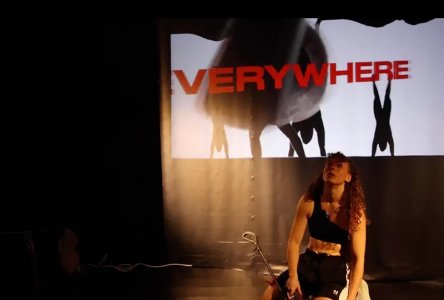
BLACKBIRD
BLACKBIRD, HER Productions with bAKEHOUSE Theatre Co at KXT on Broadway, 25 June - 5 July 2025. Photography by Ravina Jassani
Newcastle company HER Productions returns to Sydney with an ambitious production of Scottish playwright David Harrower’s 2005 two-hander Blackbird. It was controversial when first staged and since then has been seen around the world to the accompaniment of some outrage from audiences and critics alike. It was commissioned by the Edinburgh Festival, nominated for Olivier and Tony awards, and was also a Best New Play nominee in the Critics’ Awards for Theatre in Scotland. No wins, but much recognition. A review in The New York Times in 2016 described it as a “distressing, nuanced two-hander” and that it was “the most lacerating play on Broadway”. It was only March, however, so there was probably more laceration to come.
So, is it still a shocker? Should one be going in order to be appalled or infuriated? Outraged or saddened, or what? First of all, it would be a good idea to avoid taking your expectations in with you and just wait and see. Charlotte De Wit plays Una, a young woman who has come looking for the man who sexually abused her when she was 12 years old. It’s 15 years on and Ray, played by Phil McGrath, has changed his name, has a job of sorts and a new partner, and rebuilt his life after three years in jail for statutory rape. Una wants to know how old is the new woman – his age, she learns.
And what else does Una want? Whatever it turns out to be, we can be pretty sure it will be different now than it would have been in 2005. In Sydney, then, the afterglow of the Olympics was still warming us, despite 9/11. North Korea announced it had nuclear weapons (and we’re worrying about Iran?). Pope John Paul II died and we got Benedict in his stead; a win for the kiddy-fiddlers. Charles and Camilla finally got married, and Youtube was launched. Eurovision happened in Kyiv. In July, London and Sharm El Sheikh in Egypt were bombed. In August, Hurricane Katrina devastated New Orleans. In October, bombings devastated Bali bars killing 202 people including 88 Australians. A week later we barely noticed the earthquake in Kashmir that killed 86,000 and displaced millions. A week after that Saddam Hussein went to trial. In November Angela Merkel became Chancellor of Germany and Liberia elected the first female head of state in all Africa, Ellen Johnson Sirleaf. There were solar eclipses. On December 31 an extra second was added to the year.

It was, in essence a year like any other. That meant most people were preoccupied by their own lives, in their own small corners. In this instance Una and Ray meet in the lunch room of his workplace. It’s a nightmare of discarded food wrappers, containers and an overflowing bin, little wonder that nobody comes in during their 70-minute confrontation.
After a somewhat desultory beginning, director Pippa Thoroughgood maintains an interesting push-pull between her protagonists although picturing a sexual three-month “relationship” between the then 40-year-old and the then 12-year-old is tricky. That’s because De Wit, as an actor and presence, is so much more dynamic than McGrath as the – how should he be described? Abuser? Lover? Victim? Intentional or not, the imbalance adds facets of possibility and meaning, both awkward and thought-provoking.
In a previous – Broadway– production, Blackbird attracted Jeff Daniels and Michelle Williams, in the 2016 movie adaptation Ben Mendelsohn and Rooney Mara starred. These castings tell us about the curious constraints on stars – few are permitted or are brave enough to step outside their saleable, moneymaking personas. Exceptions are Daniels and Mendelsohn: both known as willingly transgressive actors, although in Blackbird/Una they were on relatively safely sanitised ground. When it comes to unhingeing the bourgeoisie Harrower could learn from real iconoclasts: Patricia Cornelius or Daniel Keene, for instance.

Nevertheless, in the virtual real-time meeting between the would-be Lolita and the never-was Humbert Humbert, there are many ideas and byways to wander, particularly how the world has changed since 2005, but not the way we look at and treat girls and women. Fascinating, flawed and worth your attention.

-c444x300.jpeg)

